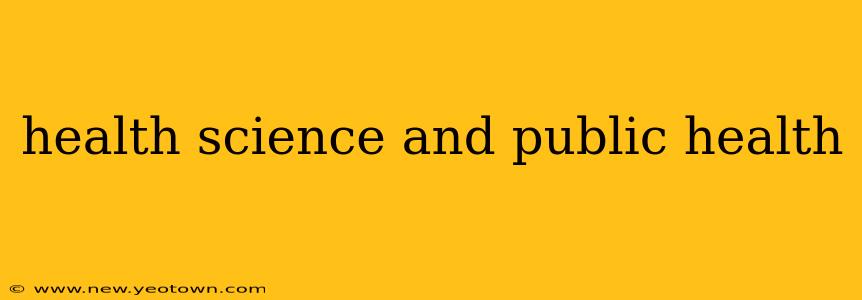The worlds of health science and public health often intertwine, yet they possess distinct focuses and career paths. Imagine two dedicated individuals, both passionate about improving human well-being, but approaching the challenge from different angles. One meticulously studies the human body at a cellular level, while the other tackles the broader societal factors influencing community health. This is the essence of the difference between health science and public health.
This article will explore the nuances of each field, comparing and contrasting their approaches, career prospects, and the essential skills required for success. We'll also delve into frequently asked questions to clarify any lingering uncertainties.
What is Health Science?
Health science is a broad field encompassing the study of the human body, its functions, and the diseases that affect it. Think of it as the microscopic view, focusing on the biological mechanisms underlying health and illness. This involves detailed research into anatomy, physiology, pathology, and pharmacology. Health science professionals are often deeply involved in diagnosis, treatment, and the development of new medical technologies.
A day in the life of a health scientist might involve conducting experiments in a lab, analyzing patient data, or collaborating on clinical trials to evaluate the effectiveness of new drugs or therapies. Their work directly contributes to advancements in medical knowledge and patient care.
What is Public Health?
Public health, in contrast, takes a macroscopic lens. It's concerned with the overall health and well-being of populations, focusing on prevention and improving the health of entire communities. This involves addressing societal determinants of health, such as poverty, access to healthcare, sanitation, and environmental factors.
A public health professional might spend their day designing and implementing health promotion programs, conducting epidemiological studies to identify disease outbreaks, or advocating for policies that improve community health infrastructure. Their work emphasizes prevention and population-level interventions to create healthier societies.
What are the Key Differences Between Health Science and Public Health?
The core difference lies in the scale of their focus:
- Health Science: Individual patient care, disease mechanisms, and development of new treatments.
- Public Health: Population-level health, disease prevention, and community well-being.
This difference extends to their methodologies:
- Health Science: Employs rigorous scientific methods like laboratory research, clinical trials, and data analysis at the individual or small-group level.
- Public Health: Utilizes epidemiological studies, health surveys, community engagement, and policy analysis to understand and address health issues at a broader scale.
What Careers Are Available in Health Science?
The health science field is expansive, offering a multitude of career paths:
- Physician: Diagnoses and treats illnesses.
- Registered Nurse: Provides direct patient care.
- Pharmacist: Dispenses medications and provides drug information.
- Medical Researcher: Conducts laboratory research to discover new treatments.
- Physician Assistant: Assists physicians in providing patient care.
What Careers Are Available in Public Health?
Public health also presents a diverse range of opportunities:
- Epidemiologist: Investigates disease outbreaks and identifies risk factors.
- Health Educator: Promotes healthy behaviors and disease prevention.
- Public Health Analyst: Analyzes health data and develops public health policies.
- Biostatistician: Applies statistical methods to public health research.
- Community Health Worker: Provides health services and support to communities.
Is a Public Health Degree Required to Work in Public Health?
While a degree in public health is beneficial and often required for many public health roles, it's not always mandatory. Professionals from diverse backgrounds, such as epidemiology, sociology, or even engineering, can contribute significantly to public health initiatives. The specific requirements depend greatly on the chosen career path within public health.
How Do Health Science and Public Health Intersect?
Despite their differences, both fields are inherently intertwined. Advancements in health science directly inform public health interventions. For instance, the development of a new vaccine (health science) enables large-scale vaccination campaigns (public health). Similarly, public health surveillance data can guide health science research priorities. Ultimately, both strive to improve human health and well-being, albeit through different approaches.
Conclusion: A Shared Goal, Different Paths
Both health science and public health are crucial for a healthy society. Choosing between them depends on your individual interests and skills. If you're fascinated by the intricacies of the human body and the development of new treatments, health science might be the better fit. If you're passionate about improving the well-being of entire communities and addressing societal health disparities, public health could be your calling. Regardless of the path you choose, the impact you can make on improving human health is significant.

